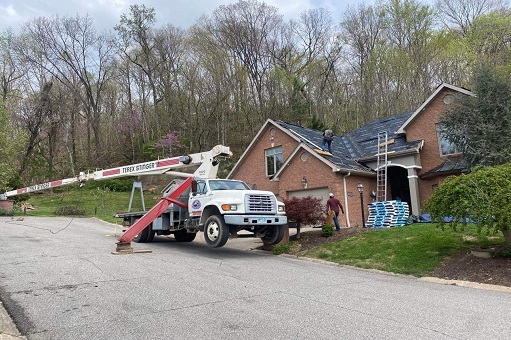Roof damage is a homeowner’s worst nightmare. A damaged roof can lead to significant expenses, whether it’s due to a sudden storm, wear and tear, or age. Fortunately, homeowners’ insurance can often provide much-needed relief in such situations.
This article will delve into the world of roof repair services and insurance.
We’ll explore how roof coverage works, the insurance claim process, reasons to supplement your insurance claim, the importance of sharing your estimate with a roofing contractor, and whether or not you should call your homeowner’s insurance company for a roof leak.
How Does Roof Coverage Work?
Homeowners’ insurance policies typically cover various aspects of your home, including the roof. This roof coverage is a crucial component, as the roof plays a fundamental role in protecting your home from the elements.
However, understanding the specifics of roof coverage can be complex.
1. Types of Roof Damage Covered
Roof coverage typically extends to various types of damage caused by covered perils. These perils often include natural disasters such as storms, hurricanes, tornadoes and non-natural events like fires or vandalism.
However, reviewing your policy is essential, as the covered perils can vary.
2. Policy Limits and Deductibles
When reviewing your insurance policy, pay close attention to the limits and deductibles associated with your roof coverage. The policy limit is the maximum amount your insurer will pay for roof repairs or replacement.
Deductibles are the out-of-pocket expenses you must cover before your insurance kicks in.
3. Age and Maintenance
Insurance companies also consider the age and maintenance of your roof when determining coverage.
If your roof is older and hasn’t been adequately maintained, you may face limitations or higher deductibles.
4. Professional Inspection
To ensure you have the right coverage for your roof, consider hiring a professional roofing inspector.
They assess the roof condition and help you understand what needs to be covered in your insurance policy.
How does the Insurance Claim Process Work?
Understanding the insurance claim process is vital when it comes to roof damage. Here, we’ll break down each step in more detail.
1. Filing a Claim
Filing a claim promptly after discovering roof damage is crucial. Contact your insurance company and provide them with detailed information about the incident. Include photographs of the damage and relevant documents, such as repair estimates.
2. Assessment by an Adjuster
After filing a claim, your insurance company will send an adjuster to evaluate the damage extent. The adjuster’s role is to evaluate the damage, determine the cause, and calculate the cost of repairs or replacement.
3. Documentation and Communication
During the assessment, it’s essential to be present and provide any necessary information to the adjuster. Clear communication can help ensure that all aspects of the damage are adequately documented.
4. Approval and Payment
Your insurance company will compensate for the repairs or replacement if the claim is approved. This payment will typically be minus your deductible. Your payment depends on your policy’s terms and the adjuster’s evaluation.
5. Choosing a Contractor
After approval, you can select a roofing contractor to repair or replace. Ensure that the contractor is licensed, bonded, and insured. Your insurance company may have recommendations for reputable contractors.
6. Completion and Inspection
Once the repairs or replacement are completed, request a final inspection from your insurance company to ensure the work meets their standards.
Why You Should Supplement Your Insurance Claim?
Supplementing your insurance claim is often a smart strategy, as it allows you to address various aspects of the repair or replacement process that your policy may not fully cover.
1. Upgrade Options
While insurance policies aim to restore your home to its pre-damaged state, they may only cover the cost of repairs or replacement with materials of similar quality. If you desire an upgrade, you’ll need to supplement your claim to cover the difference in cost.
2. Uncovered Expenses
Sometimes, your insurance policy may not fully cover all the expenses associated with roof damage. For example, interior damage caused by leaks may not be included. Supplementing your claim can help cover these additional costs.
3. Code Compliance
Building codes and regulations are continually evolving. If your roof requires updates to meet current codes and standards, you must supplement your claim to cover these necessary expenses.
4. High-Quality Materials
Roofing materials vary in quality and longevity. If you prefer high-quality materials with excellent durability and longevity, supplementing your claim can enable you to invest in these upgrades.
Conclusion
Knowledge is your most valuable asset in the complex world of roof repair service and insurance. Understanding how roof coverage works, the insurance claim process, and the benefits of supplementing your claim can empower you to make informed decisions. Moreover, involving a professional roofing contractor can provide expertise, transparency, and peace of mind throughout the repair or replacement process.
When faced with a roof leak, carefully consider the severity of the damage, your policy deductible, and your previous claims history.
In roof repair service, having a reliable partner is paramount. Imagine a roofing company that epitomizes excellence, professionalism, and dedication—meet Mr. Roofer, your trusted roofing partner.
Consult with Mr.Roofer to assess the situation and provide guidance on the best course of action. Ultimately, by taking a proactive and informed approach to roof maintenance and insurance claims, you can protect your home and ensure its longevity for years.
FAQs: Roof Repair Service and Insurance
Roof coverage in homeowners’ insurance typically includes protection against damage caused by covered perils such as storms, fires, vandalism, and certain natural disasters. However, the specifics of coverage may vary based on your policy.
To determine the age and condition of your roof, you can check your home’s records or contact the previous homeowner if possible. Hiring a professional roofing inspector can also provide a detailed assessment of your roof’s condition.
Policy limits refer to the maximum amount your insurance company will pay for roof repairs or replacement. Deductibles are the out-of-pocket expenses you must cover before your insurance coverage kicks in.
Supplementing your insurance claim can be necessary to cover expenses not fully covered by your policy, such as upgrades, uncovered costs, compliance with building codes, and hidden damage.
A roofing contractor can provide expert assessments, negotiate with the insurance company, ensure the use of quality materials, offer warranties, and oversee the repair or replacement process to meet the highest standards.
Calling your insurance company for a minor roof leak depends on various factors, including damage extent, policy deductible, and previous claims history. It’s advisable to consult a professional roofing contractor for an evaluation before deciding.
Preventive maintenance, regular inspections, and addressing minor issues promptly can help prevent roof damage. Additionally, keeping your roof clean and debris-free and ensuring proper attic ventilation can extend your lifespan.
Yes, there is a difference. Roof repair typically addresses specific areas of damage, while replacement involves replacing the entire roof. Insurance coverage may vary depending on the extent of damage and your policy terms.
Reviewing your homeowners’ insurance policy annually is a good practice to ensure it aligns with your needs and expectations. Discuss any changes or updates with your insurance provider to maintain adequate coverage.







0 Comments